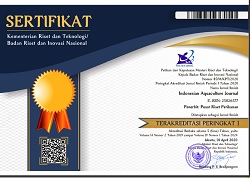THE EFFECT OF PHYTOECDYSTEROID OF Cycas revolua, Portulaca oleracea, AND Morus sp. ON MOLTING PERIOD, GROWTH AND SURVIVAL RATE OF TIGER SHRIMP, Penaeus monodon
Abstract
The problem which has still been faced in the Artificial insemination (AI) is the slow of shrimp to molt. Ecdysteroid hormone has been reported to stimulate molting of tiger shrimp. This study aims to isolate ecdysteroid hormone from Cycas revoluta, Portulaca oleracea and Morus sp. and evaluate its effect on molting period, growth and survival rate of tiger shrimp. Isolation of ecdysteroid from the leaves of three species was carried out by maceration and solvent partition method. Purification of ecdysteroid used repeated column chromatography and preparative thin layer chromatography (TLC). Evaluation of the isolated phytoecdysteroid hormone effect on molting period, growth and survival rate of shrimp was done by injecting of 100 µL phytoecdyasterod (27.5 µg/shrimp) at the first somite of ventral abdomen. As the comparison, the commercial ecdysteroid (positive control) and sterile saline solution (negative control) were also injected at the concentration of 8.6 µg/shrimp and 0 µg/shrimp, respectively. Finding showed that the highest percentage of phytoecdysteroid was obtained in Portulaca oleracea, followed by Morus sp. and Cycas revoluta with the ecdysteroid content of 0.43%, 0.22%, and 0.09%, respectively. Pytoecdysteroid isolated from the three plants was able to shorten molting period of shrimp into 4, 4, 2, and 5 days earlier for Portulaca oleracea, Morus sp., Cycas revoluta, and positive control, respectively, compared to the negative control. The highest survival rate and growth were obtained at the treatment of Portulaca oleracea, followed by Morus sp. and Cycas revoluta with the survival rate, length and weight increase of 86%, 75%, and 25%, 4.42%, 2.26% and 2.16%, and 15.90%, 10.55%, and 8.73%, respectively.
Keywords
Full Text:
PDFDOI: http://dx.doi.org/10.15578/iaj.11.2.2016.69-74

Indonesian Aquaculture Journal is licensed under a Creative Commons Attribution-ShareAlike 4.0 International License.
















_25.jpg)


